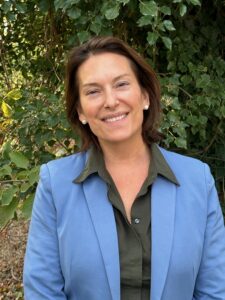PROVINCETOWN — Hadley Luddy, 54, was elected to the Massachusetts House on Nov. 5 to represent the 4th Barnstable District, which includes the four Outer Cape towns plus Orleans, Chatham, and Harwich.

Luddy, a Democrat, was the only candidate on the ballot for that seat. No Republican filed nomination papers, and Michael Herman, a select board member in Orleans, dropped his run for the Democratic nomination in May.
The seat had previously been held by Republican state Rep. Shirley Gomes, who was first elected in 1994, and then by Democratic state Rep. Sarah Peake, first elected in 2006. Peake announced she would not run for a 10th term in January, and she resigned her seat in September to take a job in Gov. Maura Healey’s administration.
When Luddy is sworn into office on Jan. 1, 2025, she will become the third woman in a row to represent the district.
Drawn to the Cape
Luddy grew up in Amherst in a family that “had some financial challenges” and didn’t travel a lot, she told the Independent in an interview just before Election Day. On her first trip to Cape Cod with high school friends at age 18, she stood atop the bluff at White Crest Beach in Wellfleet and “could not believe this amazing place existed,” she said. “It opened up a whole other world for me.”
Luddy worked on Cape Cod during the summers to help pay for an undergraduate degree in theater from UMass Boston and a master’s degree in education from Harvard.
“I worked two or three jobs each summer, mostly in Orleans, and 10 or 12 of us would rent a house together, which you really can’t do anymore,” she said.
Luddy worked at a series of restaurants including a Dairy Queen, the Blue Parrot Thai restaurant, Off the Bay Cafe, and a drink stand at Ocean Edge Golf Club.
In 1995, Luddy returned to the Cape after getting her master’s. “It was going to be one last summer here before I took an education job in New York City,” Luddy said, “but I had that draw that so many of us feel, and I decided I can’t leave this place.”
Luddy found work at the state Dept. of Children and Families, recruiting people across southeastern Massachusetts to serve as foster parents. After five years, she moved on to Community Connections, a nonprofit that serves people with disabilities, and then to a job as executive director at Big Brothers and Big Sisters of the Cape and Islands.
In 2016, Luddy became executive director of the Homeless Prevention Council, which helps people on the Outer and Lower Cape who are on the verge of losing their housing.
“Our case managers connect people to resources like fuel assistance or rental assistance and help them with this huge stack of housing applications” as well as long-term financial plans, she said.
Interlocking Crises
Luddy said her work has brought her face to face with the region’s interlocking crises: spiraling housing costs that force working people to leave the Cape, an aging population, and a lack of key services including elder care and child care.
“If you need to find a home-health-care aide, there’s a waiting list of like 500 people,” Luddy said. “When it comes to out-migration, we’ve got to be able to stop it and find solutions to keep people here and not just offer rental assistance for three years.”
To address the housing crisis, Luddy said, “it’s going to take any and all of everything” — including higher density in new housing developments, making accessory dwelling units easier and cheaper to build, and expanding incentives for landlords to rent year-round.
“ ‘Lease to Locals’ is an innovative program that incentivizes people who are renting short-term to make the transition to renting year-round,” Luddy said, adding that she hopes the program, which has been adopted in Provincetown, expands to more towns. “Several towns have a tax break for people who rent year-round, and I’ve been surprised by the number of people who come to us and say they want to rent their house.”
Luddy said that child care is “a huge barrier for local people” trying to stay on Cape Cod, and that solutions include paying child-care workers more, making training and licensing more affordable, and writing regulations that help smaller child-care centers open.
“It’s great to see universal pre-K being adopted by towns to make child care more affordable” to their residents, Luddy added.
On offshore wind power, Luddy said that “our course has already been charted by Gov. Baker and Gov. Healey and their commitment to net-zero emissions by 2050. We need to make sure these efforts are as safe and transparent as possible, but wind energy is moving forward. That’s a mandate from our state.
“I don’t think this is a ‘right’ or ‘left’ issue, and people have a lot of feelings around it,” Luddy added. “The best thing I can do is listen, be accessible on areas of concern, and provide information quickly.”
The legislature was exceptionally slow to negotiate and approve major bills this year, and several significant pieces of legislation died at the end of the formal legislative session last July 31.
“I’m aware of the issues — we’re not producing as much legislation as we could be — but I also know people want to move more quickly and take more action, and I want to be part of that,” Luddy said. “I’ll be a freshman legislator, a junior among juniors, but I’m really optimistic we’ll get things done.”



